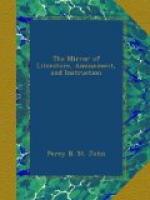manner, made to break stones or wheel barrows on the
streets or highways like galley slaves. Persons
of rank were frequently taken from their homes, immured
in prison, and dismissed after several weeks’
incarceration without knowing what alleged offence
had provoked such a wanton exercise of power contrary
to the charter and the privileges of Poland; state
offenders were carried out of the country to Russian
prisons and attempts were made to give them a journey
to Siberia, which were only prevented by the threat
of suicide on the part of the victims. The resources
of the kingdom were squandered entirely for Russian
objects; and the people were oppressed to maintain
a Polish and a Russian army. Peculation and pillage
was the order of the day. The president of the
town of Warsaw, with a salary of between 500l. and
600l. contrived to amass a fortune of 100,000l. in
fifteen years, besides living in splendour and squandering
twice his legal income. The same unprincipled
peculation was practised by other municipal or state
officers. The Russian generals were in league
with the magistrates and billet-master, to divide
the booty received from the inhabitants as the price
of exemption from the oppressive quartering of troops
on their houses. Spies were employed by the police
to watch every man of the least consequence in society,
and the nobility were often driven to the country
to avoid such dangerous intruders. In several
instances members of the diet were banished to their
estates, and made to pay the troops that guarded them,
for having ventured in the assembly, whose discussions
ought to have been free, to express a suspicion of
the government, or to hint an opinion contrary to the
taste of the grand duke.
“The following statement of facts on this head,
to which we have seen no allusion made in the public
prints, but the authenticity of which may be relied
on, will give a better idea of the system of Russian
government in Poland than any general description
could convey. We have received it from the quarter
to which we have above alluded:—
“According to the laws of Poland, a commission,
chosen by the citizens, has the right of examining
and auditing the accounts of the town. From the
tyrannical system adopted by the officers who were
continually about the person of the grand duke, they
dared not perform their duty from fear of his displeasure,
and probably, at the instigation of the miscreants
around him, being consigned to a prison; remonstrances
were, however, generally made at the half-yearly meeting
of the commission; though, up to the period immediately
before the revolution, nothing was done to check the
evil. In the month of September a circumstance
occurred, not important in itself, but of great weight
in the future course of events. Janiszewski,
a cidevant officer in the army, had sent several petitions
to the president of the town, which were treated with
neglect and insult. He and the president met in




